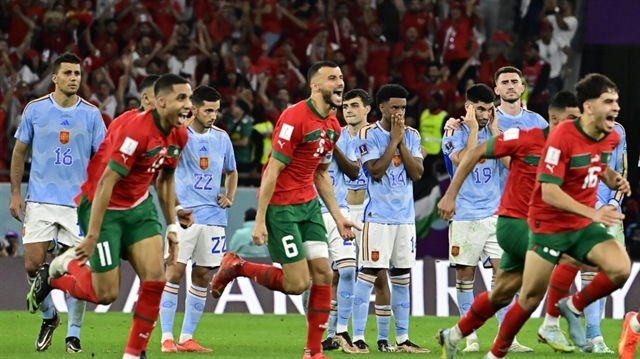 Sports
Sports

Here’s a stat that you might find hard to believe. From all the penalties taken during shootouts in the past week, almost half, yes, you heard me right, almost half, have been missed.

|
| Morocco celebrate after beating Spain on penalties. AFP Photo |
Nguyễn Thu Hương
Here’s a stat that you might find hard to believe. From all the penalties taken during shootouts in the past week, almost half, yes, you heard me right, almost half, have been missed.
Spain and Japan were the culprits who missed the most during the nail-biting knock-out games.
From a total of 17 spot-kicks taken, eight were either missed or saved. It begs the question why are so many of the world’s top players failing to deliver from 12 yards?
Football pundits, including former goalkeepers and strikers, along with data scientists have many different opinions.
Some suggest that the goalkeepers are now better at finding the winning margins thanks to the advances in technology and investment in research.
Others have talked about the waiting time before the shot adding to the nerves of players while another suggestion is players are being too picky with their techniques and they’d be better off just opting for power rather than precision.
Japan head coach Hajime Moriyasu said he allowed his players to decide who would take the penalties themselves, adding that his team seemed not to have a concrete plan for the shootouts.
Luis Enrique, his counterpart at Spain, picked the best players on his own. And Spain’s 10,000 penalties in practice gave them huge confidence, (sadly, only until before the shootouts started). Different approaches, same result.

|
| Nguyễn Thu Hương |
Did the penalties look quite random here? They might be if we don’t count in a factor and I think so far in this tournament, it is the difference between penalties that were scored and that were missed. The pressure.
Those who succeeded had little or less to lose.
When Messi stepped up, his powerful Argentina still had more than 80 minutes against Saudi Arabia, who was not the toughest opponent of the group (in theory!).
When Neymar or Bruno Fernandez scored, their teams were leading and a victory was virtually secured.
And even though it took him two attempts, Lewandowski’s penalty came when a loss to France was inevitable.
For Morocco in the shootout, people talked about them in glowing terms after they beat Belgium and topped Group E but not many people praised their chance over the title contender Spain. When the match couldn’t be decided within 120 minutes, the pressure mounted on the 2010 World Cup champions was far greater than on the north Africans.
On the flip side, those who failed had more to win but so much more to lose. The greater the expectations, the greater the pressure.
It was the same for Messi and Lewandowski, they both failed in their attempts when their teams faced many difficulties against a resilient Mexico when the penalties could have changed the game. Then they felt the constraint.
Al Dawsari couldn’t help Saudi Arabia take the lead to Poland with a penalty, which could have sent his team to the next round after they had already shocked Argentina.
Expectations frustrated Ghana’s captain Andre Ayew, as nothing was sweeter than revenge against adversaries Uruguay.
And for Japan, all eyes were on them after their victories over two gigantic teams. And the Japanese had been talking about the quarter-finals for the first time in their history.
Some reflections on what has been happening in Qatar remind me of the England team, who had a poor reputation for penalty shootouts. There are many causes that will take pages to discuss. However, this factor still applies to them: The expectations on England have always been great.
Tonight, England will challenge the defending champions France. Will the expectations be their disadvantage again if it all comes down to penalties? Let’s wait and see. — VNS

|




